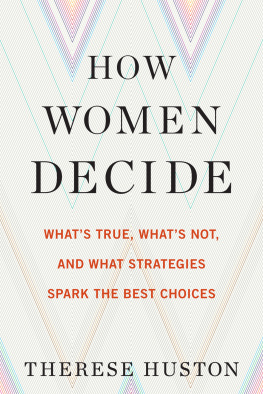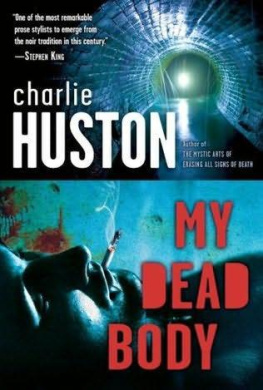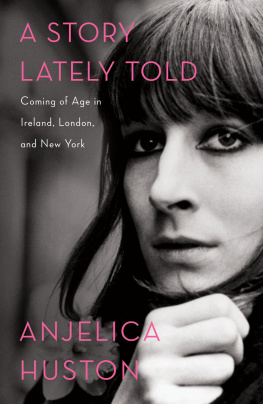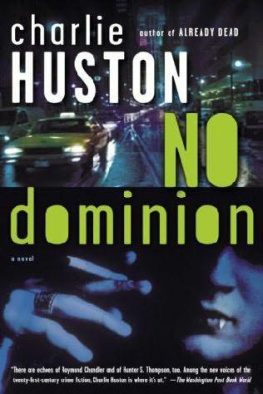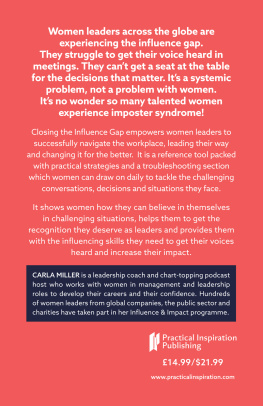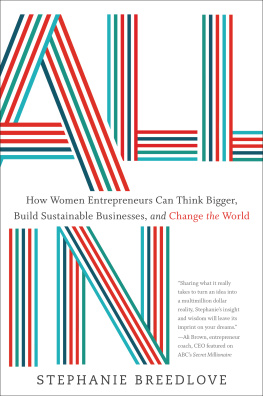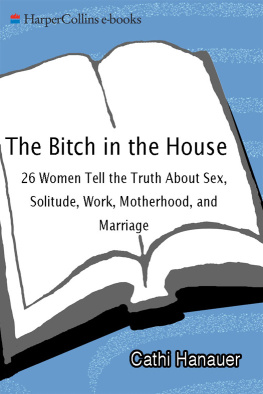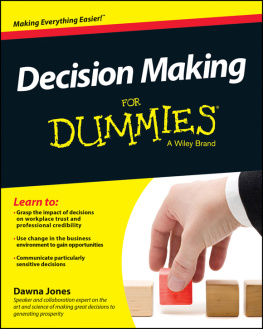Copyright 2016 by Therese Huston
All rights reserved
For information about permission to reproduce selections from this book, write to or to Permissions, Houghton Mifflin Harcourt Publishing Company, 3 Park Avenue, 19th Floor, New York, New York 10016.
www.hmhco.com
Library of Congress Cataloging-in-Publication Data:
Names: Huston, Therese, author.
Title: How women decide : whats true, whats not, and what strategies spark the best choices / Therese Huston.
Description: Boston : Houghton Mifflin Harcourt, 2016. | Includes bibliographical references.
Identifiers: LCCN 2015037243 | ISBN 9780544416093 (hardcover) | ISBN 9780544416109 (ebook)
Subjects: LCSH : Decision makingSex differences. | Decision makingPsychological aspects. | WomenPsychology.
Classification: LCC BF 448 . H 87 2016 | DDC 155.3/33dc23
LC record available at http://lccn.loc.gov/2015037243
Cover design by Martha Kennedy
v1.0516
To Jonathan,
because marrying you was the best decision I ever made
What Happens When a Woman Makes the Call?
F ROM EVERY DIRECTION LATELY , women are hearing a call to arms. Women have been told to lean in, ask for what they want, know their value, play big, don their bossypants, and close the confidence gap. These messages galvanize. They embolden women to take their proper seats at the table and they promise power to those who want it. If women work hard and raise their expectations, theyre told, they will achieve the highest levels of successand that means they will be making more of the big decisions.
But no one has talked about what happens to women when they make these big decisions. Is a womans experience issuing a tough call, a decision with serious stakes, any different from a mans? Thats the question that ignited my research and eventually caught fire as this book. Ive found that when a man faces a hard decision, he only has to think about making a judgment, but when a woman faces a hard decision, she has to think about making a judgment and also navigate being judged.
Whats a smart, self-respecting, and (lets face it) busy woman to do?
She needs to know how women decide and how to take the realities of the decision-making landscape into account when planning her own course of action. Ill share a secret with you: Women approach decisions in ways that are actually stronger than they realize. Men and women approach decisions differently, but not necessarily in the ways people have been led to believe. This isnt a biology is destiny or a pink brain / blue brain book. Society has been underestimating womens abilities to make astute choices for years, and this doubting, this routine questioning of a womans judgment, drives many of the gender differences we see.
Often we dont realize that were scrutinizing a womans decision more than we would a mans; it can be hard to notice because there are very few scenarios where all factors other than gender are identical. Sometimes, though, a situation arises where we can see a clear parallel and a clear bias. Take, for example, the moment in February 2013 when Marissa Mayer made headlines for changing Yahoos work-from-home policy. Yahoo announced that employees could no longer telecommute full-time, and the press lambasted Mayer. Pundits criticized the policy change, saying it would hurt women, and many of us, myself included, raised eyebrows about Mayers controversial decision. But how many people heard about it when Best Buys CEO, Hubert Joly, made the same decision about a week later? So for making the same judgment call, a male CEO drew some sidelong glances for a few months, but a female CEO drew extensive scrutiny and censure for years.
At first, we tend to rationalize our reactions. Yahoos decision must have impinged on more employees schedules because its a software Thats twenty times more workers touched by the Best Buy decision.
If the number of affected employees doesnt explain the outcry against Mayer and the complacency around Joly, what does? Had Mayer just taken the helm at Yahoo while Joly was a fixture at Best Buy? No. This is where the parallels become even more unsettlingboth chiefs had been on the job roughly six months. One likely reason we keep fuming over Mayers decision but ignore Jolys choice lies in a pattern that many of us unknowingly fall into: were quick to question a womans decision but inclined to accept a mans. Men and women dont have to act differently for us to see them differently.
This tendency has very real consequences. Consider the often-cited observation that businesses are eager to promote men but reluctant to promote women. Why? Your bookshelf may be full of answers to that question, but my research suggests a new one, one many people have overlooked. We trust men to make the hard choices. We are quick to accept a mans decisions, even the hard, unpleasant ones, as being what must be done. When a woman announces the same difficult decision, we scrutinize it with twice the vigor. We may not mean to, but we doubt the quality of her choices.
It may be hard to believe that decision-making has a gender component, that someone would give a man an understanding nod but give a woman a raised eyebrow for making the same call. We see ourselves as fair people with the best of intentions. Ive never met a single person who has said, I love to discriminate. If we want to understand how gender changes the decision-making process as well as the subtle and not-so-subtle ways we react to mens and womens choices, we need to ask some rigorous questions. Is there any real difference between mens and womens judgment? Might we ever exaggerate the gap? Where has popular culture exposed real disparities in the ways men and women decide, and where has popular culture actually manufactured the differences? In cases where women and men do take different approaches to the same choice, is the way women reach a decision ever an asset rather than a liability?
Most important, if we do find that there are differences in how mens and womens decisions are received, what can we do about it? How do we become more aware of our favoritism and catch ourselves in the act? Partly, we need to educate ourselves about our hidden biases around decision-making. Both men and women must take stock and strategize, because no one person can do this alone. Certainly, reading this book can and should help improve the decisions you make regardless of your gender, but if we want to see more women take meaningful seats at the table, we ought to change how we, as a culture, talk about womens judgment. We need to make some structural changes, and these changes will improve not just the lives of women but the decisions being made for our world. If you gain only one insight from this book, I hope its this: Having a greater number of women in the room when a crucial decision is being made is not only better for women, its better for the decision. And thats better for everyone.
Whom Do We Ask to Make Decisions of Consequence?
It was January 1968 and a typical winter day in Seattle, cold enough to make you bundle up but not cold enough to snow. Barbara Winslow was twenty-three years old and a history major at the University of Washington, and she and her husband of less than a year were sitting in a doctors office, not liking what they heard.
A few days earlier, Barbara had found a lump in her breast. The doctor explained he would sedate Barbara, take a slice out of her breast, run some tests while she was still under anesthesia, and, if the biopsy came back positive and the tissue was malignant, he would immediately perform a radical mastectomy. A radical mastectomy is aptly named. It entails removing the entire breast, the chest muscles underneath, and all the lymph nodes from a womans underarm in one single, efficient, and slightly barbaric procedure. Barbara would fall asleep wondering if she had cancer, and she would wake up to either fantastic news or stitches where her breast had been.
Next page
